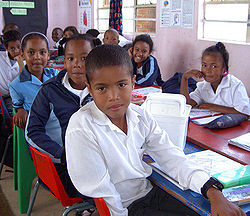Cape Coloureds
 Extended coloured family with roots in Cape Town, Kimberley and Pretoria. | |
| Regions with significant populations | |
|---|---|
| South Africa, Namibia, Zimbabwe | |
| Languages | |
| Kaapse Afrikaans, South African English | |
| Religion | |
| Christian (80%), Muslim (5%)[1] | |
| Related ethnic groups | |
| Afrikaners, European, Khoikhoi, Xhosa, Cape Malay |



The term Cape Coloureds refers to the modern-day descendants of slave labourers imported into South Africa by Dutch settlers as well as to other groups of mixed ancestry originating in the present-day Western Cape. They are the predominant population group found in the Western Cape Province. Their population size is roughly 4 million. Most Cape Coloureds are mother tongue Afrikaans speakers, as a result of their cultural development in the Dutch and Afrikaans-speaking areas of South Africa; but a minority are English speaking. Slaves of Malay ancestry were brought from Indonesia, Malaysia, Madagascar, and Mozambique; and from these diverse origins they gradually developed into a grouping; along with coloured people (African and European origin); that was subsequently classified as a single major ethnical grouping under the Apartheid regime. In many cases the slaves were imported to be concubines and wives to single male Dutch settlers. People from India and the islands within the Indian Ocean region were also taken to the Cape and sold into slavery by the Dutch settlers. The Indian slaves were almost invariably given Christian names but their places of origin were indicated in the records of sales and other documents so that it is possible to get an idea of the ratio of slaves from different regions. These slaves were, however, dispersed and lost their cultural Indian identity in the course of time, hence being labelled Cape Coloureds. Much racial mixture has thus occurred over the generations, between the Europeans, Indians, Malays, various Bantu tribes, along with indigenous Khoi and San.
Technically, the term Cape Coloured referred to a subset of Coloured South Africans, with subjective criteria having been used by the Apartheid bureaucracy to determine whether a person was a Cape Coloured, or belonged to one of a number of other related "Coloured" subgroups such as the "Cape Malays", or "Other Coloureds". Currently the term "Coloured" is used to distinguish people of mixed ancestry from the phenotypically (and generally more genetically homogeneous) paler South Africans of European descent, and the darker black South Africans. There are often exceptions to this generalization, and consequently Apartheid classifications often led to tragi-comic consequences, with some paler family members being classified as white and others coloured. This contentious classification had in the past no consistent meaning among South Africans – opinion, more than anything else, dictates who is classified as Cape Coloured.
The Cape Coloured group is far from being homogeneous: the divisions within it were accentuated by the Apartheid classifications which defined type hierarchies with this grouping. As a consequence, there is much racial intolerance between self-defined groups of Cape Coloureds. Many Cape Coloureds are from totally different heritages, some having mostly European and others mostly black South African heritage. Many also have mostly Indian or mostly Indonesian/Malay heritage. Religious differences also exist, many being Christian and others Muslim. Therefore many Cape Coloureds feel very insulted being classified into the single Coloured racial category.
Famous Cape Coloureds
Sport
Athletics
Sergio Mullins, 2008 Olympian, S.A Sprinter.
Shaun Abrahams, 800m Runner.
Geraldine Pillay, 2004 Olympian,Commonwealth medalist.
Donovan Wright, marathon runner.
Leigh Julius, 2004 Olympian.
Cricket
Omar Henry
Basil d'Oliveira
Jean-Paul Duminy
Herschelle Gibbs
Ashwell Prince
Robin Peterson
Charl Langeveldt
Garnett Kruger
Wayne Parnell
Justin Ontong
Alviro Petersen
Rugby
Bryan Habana
Breyton Paulse
Adrian Jacobs
Conrad Jantjes
Ashwin Willemse
Bolla Conradie
Football
Benni McCarthy
Mark Williams
Shaun Bartlett
Andre Arendse
Delron Buckley
Quinton Fortune
Lance Davids
Nasief Morris
Steven Pienaar
Moeneeb Josephs
Politics
Trevor Manuel, former Finance Minister, currently Head of National Planning Commission.
Gerald Morkel, the former mayor of Cape Town.
Dan Plato, Mayor of Cape Town.
Percy Sonn, former president of the International Cricket Council.
Adam Small (Writer)
Entertainment
Jonathan Butler, Jazz musician.
Meryl Cassie, actress from Sci-Fi series The Tribe.
Lesley-Ann Brandt, actress from Spartacus Blood and Sand TV series.
Jean Grae, Hip-Hop artist.
Kurt Schoonraad, South African comedian.
Soli Philander, television and radio presenter.
Marc Lottering, comedian.
Jenny Powell, television presenter.
Cape Coloureds in the media
A group of Cape Coloureds were interviewed in the documentary series Ross Kemp on Gangs. One of the gang members who participated in the interview mentioned that black South Africans have been the main beneficiaries of South African social promotion initiatives while the Cape Coloureds have been further marginalized.
The award winning film I'm Not Black, I'm Coloured - Identity Crisis at the Cape of Good Hope (Monde World Films, 2009 USA release) is one of the first historical documentary films to explore the legacy of Apartheid through the viewpoint of the Cape Coloured community, including interviews with elders, Pastors, members of Parliament, students and everyday people struggling to find their identity in the new South Africa.
References
- ^ "The Coloureds of Southern Africa". MixedFolks.com. Retrieved 2009-10-23.
